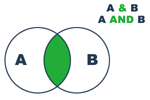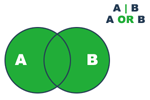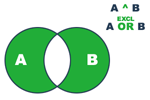Boolean operators
You cannot do wildcard searches using asterisks (*) or question marks (?) when searching index files.
Commonly used Boolean operators:
-
AND (&): Insert between two words to find only documents that contain both words. This narrows the search, because documents containing only one of the words are not found.
-
OR ( | ): Insert between two words to find all documents containing either word. This gives a wider search, because more documents are likely to fulfill this condition. Documents containing both words are also found.
-
EXCLUSIVE OR (^): Insert between two words to find all documents containing either word, but not containing both.
-
NOT (~): Insert before a search word to exclude all documents that contain the word. You can combine this with a positive search request, for example: type "Invoice(NOT) Corp" to find all documents that contain the word Invoice but do not contain the word "Corp".
Important syntax requirements:
-
Always enclose search terms in parentheses when entering the operator as a keyword, so the operator is not interpreted as a symbol.
-
Do not add spaces before and after the operators.
-
Use parentheses to specify the order of operations. For example, type:
Europe&(Paris|Brussels)First, there is an OR search on "Paris" and "Brussels", and then an AND search on the result with "Europe". So it finds all documents with either "Paris" or "Brussels", but then retains only those that also contain "Europe".
In the following examples, A and B represent search words or strings. The green area in the diagrams shows which occurrences are found.
| Operator | Symbol | Examples | Diagram |
| AND | & |
(A)AND(B) A&B
|

|
| OR | | |
(A)OR(B) A|B |

|
| EXCLUSIVE OR | ^ |
(A)EXCLUSIVE OR(B) A^B |

|
| NOT (alone) | ~ |
NOT(A) ~A |
 1 1
|
| NOT (combined) | ~ |
(A)NOT(B) A~B |

|